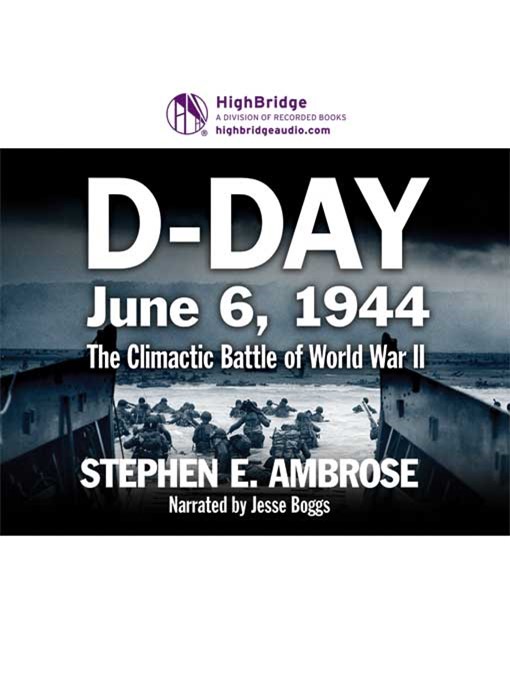On the basis of 1,400 oral histories from the men who were there, Eisenhower biographer and World War II historian Stephen E. Ambrose reveals for the first time anywhere that the intricate plan for the invasion of France in June 1944, had to be abandoned before the first shot was fired. The true story of D-Day, as Ambrose relates it, is about the citizen soldiers - junior officers and enlisted men - taking the initiative to act on their own to break through Hitler's Atlantic Wall when they realized that nothing was as they had been told it would be. This is a brilliant telling of the battles of Omaha and Utah beaches, based on information only now available, from American, British, Canadian, French, and German veterans, from government and private archives, from never before utilized sources on the home front, gathered and analyzed by the author, who has made D-Day his life work. Ambrose's first interview was with General Eisenhower in 1964, his last with paratroopers from the 101st Airborne in 1993. Called the premier American narrative and military historian, Ambrose explains the most important day of the twentieth century. The action begins at midnight, June 5/6, when the first British and American airborne troops jumped into France to launch the invasion. It ends at midnight, June 6/7. Focusing on those pivotal twenty-four hours, this is the story of individuals rather than units. It moves from the level of Supreme Commander to that of a French child, from General Omar Bradley to an American paratrooper, from Field Marshal Montgomery to a British private, from Field Marshal Rommel to a German sergeant. Ambrose covers the politics of D-Day, from Churchill's resistance to the operation to Stalin's impatience and Roosevelt's concern. On the other side were Hitler's command structure, German policy, and the plot against the Fuhrer. This is the epic victory of democracy in winner-take-all combat. When Hitler declared war on the United States, he bet that the young men brought up in the Hitler Youth would outfight the Boy Scouts. Ambrose shows how wrong he was.
- Read-Along eBooks for Children
- Get Hooked on a Series- eBook
- Winter Reading
- eBook Shorts: Your Favorite Stories, but Shorter
- Percy Jackson Collection
- Graphic Novels & Comics
- Romance in the Middle, Ages That Is
- Living on the Edge
- Is It True Dukes Have More Fun?
- Danielle Steel eBooks
- True Stories of World War II
- Biographies of Early Americans - eBooks
- Shifting Sands
- See all
- Read by the Author
- Short Stories for Short Commutes
- Have You Listened to the Most Popular Titles in the Collection?
- Winter Listening
- Percy Jackson Collection
- Animals on Audiobooks
- Audiobooks the Whole Family Will Enjoy...
- Audie Award Winners
- Oldies But Goodies
- Get Hooked on a Series- Audio
- Audiobooks You Might Have Missed
- Listen and Learn
- Listen & Learn: Science Nonfiction
- See all
- 2021 Library Reads
- 2022-2023 Great Stone Face Short List
- 2022-2023 Isinglass Award Short List
- 2022-2023 Flume Award Short List
- 2018-2022 Ladybug Award Nominees
- Romance Award Winners
- 2020 Library Reads
- Edgar Award Winners
- 2019 Library Reads
- Sci-Fi and Fantasy Award Winners
- 2018 Library Reads
- Book Shimmy Awards
- 2017 Library Reads
- See all
- Travel Magazines
- News Magazines
- Heath & Fitness Magazines
- Gardening and Outdoor Living Magazines
- Popular Magazines
- House and Home Magazines
- Tech and Gaming Picks
- Magazines for History Lovers
- Crafts & Hobbies Magazines
- Food & Wine Magazines
- Delving Into Your Devices
- Magazines for Science Enthusiasts
- Hobby magazines
- See all


